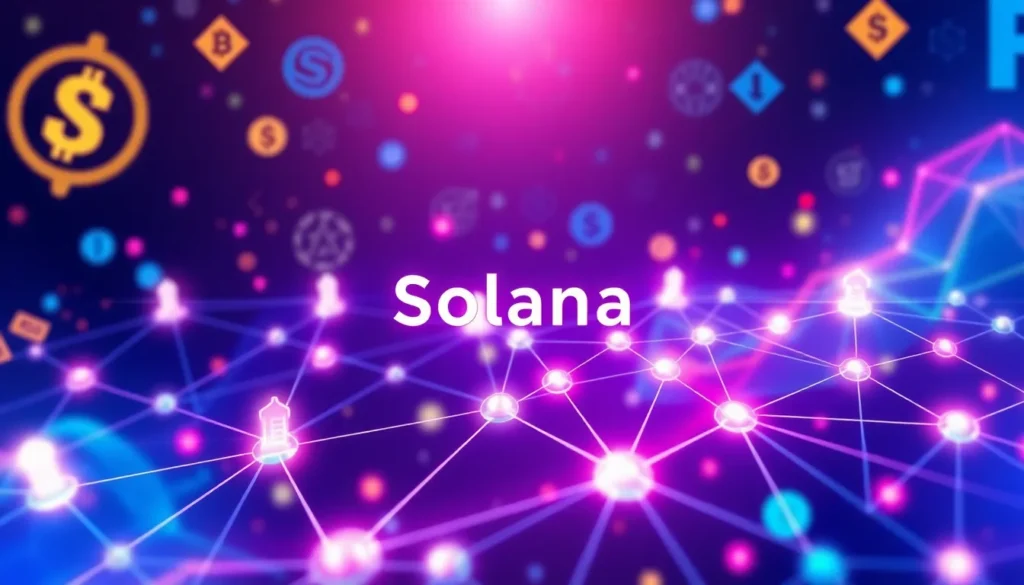Table of Contents
ToggleIn the ever-evolving world of cryptocurrency, Solana shines like a diamond in a sea of digital rocks. But as it gains traction, one burning question looms: is Solana centralized? This inquiry is more than just a casual chat at a coffee shop; it’s a deep dive into the heart of blockchain technology.
Overview of Solana
Solana stands out in the blockchain space due to its speed and scalability. Its architecture enables high throughput, processing thousands of transactions per second. Transactions confirm within seconds, which supports various decentralized applications and services.
The platform utilizes a unique consensus mechanism called Proof of History. This mechanism timestamps transactions to enhance reliability and improve efficiency. Unlike traditional blockchains, where transactions compete for validation, Solana’s architecture allows for parallel processing, making its operation more streamlined.
Centralization concerns arise regarding the network’s validator nodes. As of 2023, the number of active validators is significantly lower than on other networks, raising questions about decentralization. Typically, fewer validators can lead to greater control by a smaller group, impacting the network’s resistance to censorship and manipulation.
Governance structures impact decentralization levels. Solana’s governance model involves SOL token holders, who participate in decision-making and protocol upgrades. However, as the ecosystem matures, determining how decentralization influences governance becomes crucial.
The community surrounding Solana plays a vital role. Developers and users contribute to discussions and developments, fostering innovation. Engagement from diverse stakeholders strengthens the network’s resilience against centralizing forces.
Insights into these aspects help frame discussions around Solana’s centralization. Evaluating transaction speed, governance, and community involvement offers a comprehensive view of Solana’s position within the broader cryptocurrency landscape.
Understanding Centralization

Centralization refers to the concentration of control within a single entity or a small group within a network. This dynamic can significantly influence how a blockchain operates and the degree to which it remains decentralized.
Definition of Centralization
Centralization describes a system where power or authority rests with a limited number of entities rather than distributed across a broad network. In cryptocurrency networks, a lower number of validators often equates to greater control held by fewer participants. Various blockchain systems illustrate this concept, where the number of active nodes directly correlates with decentralization levels. For instance, Solana’s smaller validator count raises concerns about dependency on select operators. This consolidation can affect transaction integrity and network resilience.
Importance in Blockchain
Decentralization plays a crucial role in enhancing the security and reliability of blockchain technology. It mitigates the risk of censorship or fraud by dispersing control across a wide array of participants. Each additional validator strengthens a network’s resistance to attacks and promotes transparency in transaction validation. In the cryptocurrency landscape, decentralized governance enables stakeholders to influence changes and developments. Thus, a truly decentralized network, like an ideal blockchain, maximizes security, fosters innovation, and nurtures community trust. Understanding these dynamics becomes essential for evaluating a platform’s long-term sustainability.
Is Solana Centralized?
Solana’s centralization concerns stem from its network structure and validator distribution. Analyzing these factors reveals insights into its overall decentralization.
Network Structure
The network relies on a limited number of validator nodes, which influences centralization levels. With fewer nodes compared to leading blockchain platforms, a smaller group can exert greater control over the network’s operations. This structure can lead to vulnerabilities, as decisions made by a concentrated set of validators may not always reflect the broader community’s interests. Moreover, the rapid transaction processing speed comes with a trade-off in terms of decentralization. While efficiency is paramount, it raises questions about the long-term implications for governance and resilience.
Validator Distribution
Validator distribution on Solana shows a marked disparity. A significant portion of the transaction validation responsibilities rests with a limited number of validators. This unequal distribution can affect network reliability and censorship resistance. When too few entities control a large share of validation, decentralization suffers. The concentration of power can facilitate decision-making but undermines transparency and trust within the ecosystem. Increasing the number of active validators offers a pathway to enhance decentralization, fostering trust and resilience in the network.
Pros and Cons of Centralization
Centralization in blockchain networks like Solana presents a range of benefits and risks. Understanding these aspects provides insights into its operational dynamics.
Benefits of Centralized Systems
Centralized systems often offer faster transaction speeds. Solana’s unique structure allows for high throughput, processing thousands of transactions per second. Reduced latency contributes to a more seamless user experience. Additionally, decision-making processes can be more streamlined, enabling quicker adaptation to market changes. Effective governance structures often emerge, fostering accountability among a smaller group of decision-makers. This can enhance operational efficiency, crucial for maintaining competitive advantages in the fast-paced cryptocurrency landscape.
Risks of Centralization
Centralized systems pose significant risks associated with control concentration. A limited number of validator nodes can lead to systemic vulnerabilities, as fewer entities hold power over network governance. Such concentration might compromise transaction integrity, making the network susceptible to manipulation or censorship. Moreover, community interests may not be adequately represented, undermining stakeholder trust. Relying on a smaller group for validation increases the risk of collusion, posing threats to decentralization ideals. Addressing these risks becomes essential for preserving Solana’s long-term sustainability and community confidence.
Community Perspectives
Community perspectives on Solana’s centralization reveal a mix of optimism and concern. Enthusiasts appreciate the platform’s speed and scalability, attracting numerous developers to build decentralized applications. Validators actively participating in Solana’s network often express contentment with its efficiency, spotting opportunities for growth and improvement.
Critics point to the limited number of active validators as a potential risk. A smaller validator pool can facilitate centralized control, which deviates from the decentralized ethos of blockchain technology. Participants in the community highlight the importance of a diverse validator network to ensure broad representation and trust.
User experiences also contribute to discussions about governance. Token holders frequently engage in decision-making processes that affect the network’s future. Feedback from these holders influences governance, shaping the ecosystem’s development and addressing centralization concerns.
Comparative analyses of Solana and other platforms further illuminate community opinions. Some community members argue that while Solana excels in transaction speed, its centralization might lead to vulnerabilities in the long run. Others suggest that a balance between efficiency and decentralization is essential for the platform’s sustainability.
Efforts to increase validator participation have gained traction, reflecting community determination to enhance decentralization. Many users advocate for initiatives that lower barriers to entry for new validators. Such actions could help distribute control more evenly across the network.
Community perspectives on Solana’s centralization encompass both positive insights and critical assessments, emphasizing the need for ongoing dialogue and improvement within the ecosystem.
Solana’s journey in the cryptocurrency realm highlights a complex balance between speed and centralization. While its rapid transaction capabilities attract developers and users alike, the concentration of validator nodes raises valid concerns about control and governance. The community’s mixed feelings reflect a broader tension within blockchain ecosystems where efficiency often clashes with decentralization ideals.
As Solana evolves, increasing validator participation will be vital in addressing these centralization issues. Fostering a more diverse validator network can enhance trust and resilience, ensuring that the platform remains aligned with the interests of its user base. Continuous dialogue and proactive measures will ultimately shape Solana’s future, influencing its sustainability and standing in the competitive landscape.







